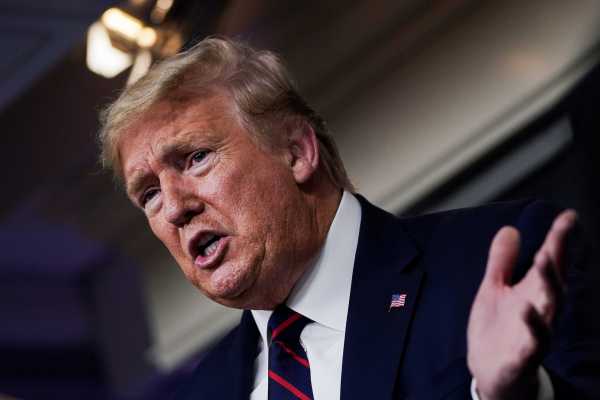
President Donald Trump said on Friday that he will not adhere to a portion of the $2 trillion coronavirus stimulus bill that would authorize an inspector general to oversee how $500 billion in business loans will be spent.
In a statement released early Friday evening, Trump announced that he had signed into law the Coronavirus Aid, Relief, and Economic Security or CARES Act, a relief package aimed at mitigating some of the economic fallout caused by efforts to allay the spread of Covid-19.
That bill also establishes a Special Inspector General for Pandemic Recovery (SIGPR) within the Treasury Department to audit and investigate half a trillion dollars in loans for large businesses. In his signing statement, Trump said that this provision raises “constitutional concerns,” adding that his administration would not comply with such an official’s request for documents.
“I do not understand, and my Administration will not treat, this provision as permitting the SIGPR to issue reports to the Congress without the presidential supervision required by the Take Care Clause,” part of Article II Section 3 of the Constitution that states a sitting president “shall take care that the laws be faithfully executed.” This seems to suggest the administration believes it is the president’s duty and not that of an inspector general to ensure the funds are distributed as the law intends.
The special inspector general, as authorized within the bill, would be able to request information from government agencies and report on failures to comply with those information requests. In his signing statement, Trump essentially stated that he will not let such reports reach Congress without his approval, which many fear directly undermines the provision’s goal of maintaining transparency in how that fund is handled.
The $500 billion loan program was the biggest point of contention between Democratic and Republican lawmakers throughout the relief bill’s negotiation process. Democrats called this a “slush fund” that would give Treasury Secretary Steven Mnuchin broad authority to disburse the funds as he saw fit. The IG provision was intended as an accountability effort to alert Congress if the Trump administration was not complying with auditing measures. It was also meant to help ensure the president and his family did not directly benefit from the emergency funds through their businesses.
The addition of this transparency language was what ultimately swayed some Democrat senators to vote for the bill. The bill also establishes a congressional oversight panel to examine the IG’s reports.
Trump also said that he would not adhere to a second provision of the bill that would grant some congressional committee consultation for expenditures made by the State Department, Department of Veterans Affairs, and US Agency for International Development (USAID).
“These provisions are impermissible forms of congressional aggrandizement with respect to the execution of the laws,” Trump’s statement reads.
The inspector general was put in place to make sure bailout funds helped the vulnerable
The broader coronavirus relief package also guarantees direct cash payments to many adult workers, expands unemployment insurance, and provides $367 billion in loans to small businesses.
But it was the inclusion of a $500 billion corporate loan program — which includes a guaranteed $50 billion for the airline industry — that proved a key sticking point in the bill’s negotiation. Earlier this week, Democrats blocked a version of the package that they said did not contain strong enough oversight over that fund.
As Vox’s Emily Stewart reported, most Americans also backed some form of “guardrails” on those corporate bailout funds, such as ensuring that companies receiving bailout funds commit to not laying off workers. Last week, more than 3.3 million people filed for unemployment, shattering the previous record of about 700,000 claims in 1982.
Without oversight of how the funds would be allocated, “what’s to stop an airline from using its bailout money to give its CEO a bonus instead of paying its workers?” Stewart wrote. “Or to prevent a major hotel chain from laying off workers while engaging in stock buybacks?”
In addition to establishing an inspector general, the final bill passed on Friday also prohibits businesses controlled by administration officials, including the president, vice president and members of Congress, as well as their families, from receiving loans from that fund.
Earlier last week, Trump declined to commit to exempting his business interests from bailout funds, telling reporters, “Let’s just see what happens.”
Now, in his signing statement, Trump has made clear that he will decide what information about how the funds are being used Congress needs. This comes just months after the end of an impeachment inquiry into Trump that was sparked by another attempt by his administration to keep independent reports about its inner workings from reaching Congress.
During the lead-up to what became Trump’s impeachment hearing, a whistleblower’s memo about a phone call with Ukrainian leadership should have, according to federal law, been reported to Congress by the director of national intelligence. It was not, but came to light in September nonetheless.
Trump’s sharpest critics have already begun to raise the alarm about Trump’s plans to shrug off the new law’s transparency requirements. On Twitter, Rep. Alexandria Ocasio-Cortez, who had earlier denounced the corporate fund, wrote, “This is a frightening amount of public money to have given a corrupt admin w/ 0 accountability.”
It is clear that Covid-19 will have devastating effects on the economy. It’s “an economic tsunami,” one economist told Vox’s Ezra Klein, one that will affect businesses of all sizes and their employees. That includes the large companies that will benefit from the corporate fund. But allocating money to industries with little oversight to how it is being spent is not guaranteed to help the everyday workers, customers, and small-business owners expected to be most dramatically affected by the virus’s economic impact — it could, however, help the president and his businesses.
Sourse: vox.com






